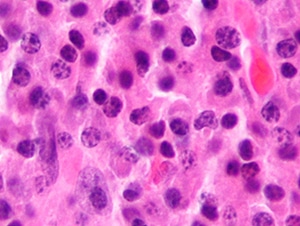New Immunotherapy for Multiple Myeloma
The FDA granted accelerated approval to a targeted immunotherapy for patients with relapsed or refractory multiple myeloma.
The U.S. Food and Drug Administration (FDA) has granted accelerated approval to teclistamab-cqyv (Tecvayli), a type of immunotherapy called a bispecific T-cell engager (BiTE), for the treatment of adult patients with relapsed or refractory multiple myeloma who previously received at least four lines of therapy.
BiTEs are a class of monoclonal antibody constructs able to connect a patient’s own T cells to cancer cells. Teclistamab-cqyv simultaneously binds the CD3 receptor present on T cells and the B-cell maturation antigen (BCMA) that is highly expressed on the surface of myeloma cells. As a result, T cells are activated to kill cancer cells. Teclistamab-cqyv was the first BCMA-directed BiTE to be approved.

The accelerated approval was based on the results of the single-arm, multi-cohort, open-label MajesTEC-1a clinical trial that included 110 patients with multiple myeloma who had previously received at least three prior therapies, including a proteasome inhibitor, an immunomodulatory agent, and a monoclonal antibody targeting the CD38 antigen but had not previously received a BCMA-targeting therapy.
The overall response rate was 61.8 percent. With a median follow-up of 7.4 months, among responders, 90.6 percent were estimated to still be responding to treatment after six months, and 66.5 percent were estimated to still be responding at nine months.
The approval of teclistamab-cqyv came with a boxed warning indicating that the treatment can cause severe side effects and is only available through a restricted risk management program.
Multiple myeloma is a disease that affects plasma cells, a type of blood cell derived from B lymphocytes that are responsible for producing antibodies. In patients with multiple myeloma, abnormal plasma cells accumulate in the bone marrow or soft tissues. According to federal statistics, more than 34,000 multiple myeloma cases were estimated to be diagnosed in the U.S. in 2022.
The approval was rendered on October 25, 2022. Accelerated approval means continued approval may be contingent upon a confirmatory trial.